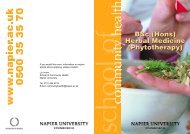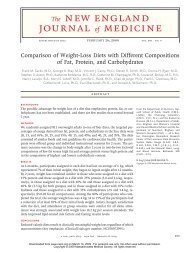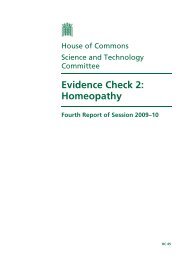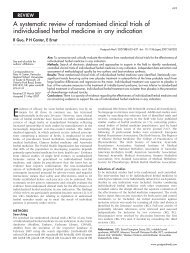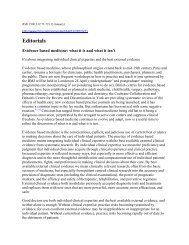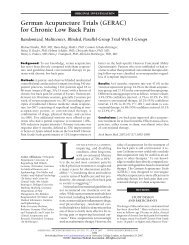- Page 4:
Unit 4: Development Through the Lif
- Page 9:
Ten principles for delivering an Ed
- Page 12 and 13:
BTEC National DiplomaThe 1080 GLH (
- Page 14 and 15:
Structure of the qualificationEdexc
- Page 16 and 17:
Edexcel Level 3 BTEC National Certi
- Page 18 and 19:
Edexcel Level 3 BTEC National Certi
- Page 20 and 21:
Edexcel Level 3 BTEC National Certi
- Page 22 and 23:
Edexcel Level 3 BTEC National Certi
- Page 24 and 25:
Edexcel Level 3 BTEC National Diplo
- Page 26 and 27:
Edexcel Level 3 BTEC National Diplo
- Page 28 and 29:
Edexcel Level 3 BTEC National Diplo
- Page 30 and 31:
Edexcel Level 3 BTEC National Diplo
- Page 32 and 33:
Unit formatAll units in Edexcel Lev
- Page 34 and 35:
26BN018467 - Specification - Edexce
- Page 36 and 37:
Unit 27: Dealing with Challenging B
- Page 38 and 39:
UNIT 1: DEVELOPING EFFECTIVE COMMUN
- Page 40 and 41:
UNIT 1: DEVELOPING EFFECTIVE COMMUN
- Page 42 and 43:
UNIT 1: DEVELOPING EFFECTIVE COMMUN
- Page 44 and 45:
UNIT 1: DEVELOPING EFFECTIVE COMMUN
- Page 46 and 47:
UNIT 1: DEVELOPING EFFECTIVE COMMUN
- Page 48 and 49:
UNIT 1: DEVELOPING EFFECTIVE COMMUN
- Page 50 and 51:
UNIT 1: DEVELOPING EFFECTIVE COMMUN
- Page 52 and 53:
UNIT 2: EQUALITY, DIVERSITY AND RIG
- Page 54 and 55:
UNIT 2: EQUALITY, DIVERSITY AND RIG
- Page 56 and 57:
UNIT 2: EQUALITY, DIVERSITY AND RIG
- Page 58 and 59:
UNIT 2: EQUALITY, DIVERSITY AND RIG
- Page 60 and 61:
UNIT 2: EQUALITY, DIVERSITY AND RIG
- Page 62 and 63:
UNIT 2: EQUALITY, DIVERSITY AND RIG
- Page 64 and 65:
UNIT 2: EQUALITY, DIVERSITY AND RIG
- Page 66 and 67:
UNIT 3: HEALTH, SAFETY AND SECURITY
- Page 68 and 69:
UNIT 3: HEALTH, SAFETY AND SECURITY
- Page 70 and 71:
UNIT 3: HEALTH, SAFETY AND SECURITY
- Page 72 and 73:
UNIT 3: HEALTH, SAFETY AND SECURITY
- Page 74 and 75:
UNIT 3: HEALTH, SAFETY AND SECURITY
- Page 76 and 77:
UNIT 3: HEALTH, SAFETY AND SECURITY
- Page 78 and 79:
UNIT 3: HEALTH, SAFETY AND SECURITY
- Page 80 and 81:
UNIT 4: DEVELOPMENT THROUGH THE LIF
- Page 82 and 83:
UNIT 4: DEVELOPMENT THROUGH THE LIF
- Page 84 and 85:
UNIT 4: DEVELOPMENT THROUGH THE LIF
- Page 86 and 87:
UNIT 4: DEVELOPMENT THROUGH THE LIF
- Page 88 and 89:
UNIT 4: DEVELOPMENT THROUGH THE LIF
- Page 90 and 91:
UNIT 4: DEVELOPMENT THROUGH THE LIF
- Page 92 and 93:
UNIT 5: FUNDAMENTALS OF ANATOMY AND
- Page 94 and 95:
UNIT 5: FUNDAMENTALS OF ANATOMY AND
- Page 96 and 97:
UNIT 5: FUNDAMENTALS OF ANATOMY AND
- Page 98 and 99:
UNIT 5: FUNDAMENTALS OF ANATOMY AND
- Page 100 and 101:
UNIT 5: FUNDAMENTALS OF ANATOMY AND
- Page 102 and 103:
UNIT 5: FUNDAMENTALS OF ANATOMY AND
- Page 104 and 105:
UNIT 5: FUNDAMENTALS OF ANATOMY AND
- Page 106 and 107:
UNIT 6: PERSONAL AND PROFESSIONAL D
- Page 108 and 109:
UNIT 6: PERSONAL AND PROFESSIONAL D
- Page 110 and 111:
UNIT 6: PERSONAL AND PROFESSIONAL D
- Page 112 and 113:
UNIT 6: PERSONAL AND PROFESSIONAL D
- Page 114 and 115:
UNIT 6: PERSONAL AND PROFESSIONAL D
- Page 116 and 117:
UNIT 6: PERSONAL AND PROFESSIONAL D
- Page 118 and 119:
UNIT 6: PERSONAL AND PROFESSIONAL D
- Page 120 and 121:
UNIT 6: PERSONAL AND PROFESSIONAL D
- Page 122 and 123:
UNIT 7: SOCIOLOGICAL PERSPECTIVES F
- Page 124 and 125:
UNIT 7: SOCIOLOGICAL PERSPECTIVES F
- Page 126 and 127:
UNIT 7: SOCIOLOGICAL PERSPECTIVES F
- Page 128 and 129:
UNIT 7: SOCIOLOGICAL PERSPECTIVES F
- Page 130 and 131:
UNIT 7: SOCIOLOGICAL PERSPECTIVES F
- Page 132 and 133:
UNIT 8: PSYCHOLOGICAL PERSPECTIVES
- Page 134 and 135:
UNIT 8: PSYCHOLOGICAL PERSPECTIVES
- Page 136 and 137:
UNIT 8: PSYCHOLOGICAL PERSPECTIVES
- Page 138 and 139:
UNIT 8: PSYCHOLOGICAL PERSPECTIVES
- Page 140 and 141:
UNIT 8: PSYCHOLOGICAL PERSPECTIVES
- Page 142 and 143:
UNIT 9: VALUES AND PLANNING IN SOCI
- Page 144 and 145:
UNIT 9: VALUES AND PLANNING IN SOCI
- Page 146 and 147:
UNIT 9: VALUES AND PLANNING IN SOCI
- Page 148 and 149:
UNIT 9: VALUES AND PLANNING IN SOCI
- Page 150 and 151:
UNIT 9: VALUES AND PLANNING IN SOCI
- Page 152 and 153:
UNIT 10: CARING FOR CHILDREN AND YO
- Page 154 and 155:
UNIT 10: CARING FOR CHILDREN AND YO
- Page 156 and 157:
UNIT 10: CARING FOR CHILDREN AND YO
- Page 158 and 159:
UNIT 10: CARING FOR CHILDREN AND YO
- Page 160 and 161:
UNIT 10: CARING FOR CHILDREN AND YO
- Page 162 and 163:
UNIT 10: CARING FOR CHILDREN AND YO
- Page 164 and 165:
UNIT 10: CARING FOR CHILDREN AND YO
- Page 166 and 167:
UNIT 11: SUPPORTING AND PROTECTING
- Page 168 and 169:
UNIT 11: SUPPORTING AND PROTECTING
- Page 170 and 171:
UNIT 11: SUPPORTING AND PROTECTING
- Page 172 and 173:
UNIT 11: SUPPORTING AND PROTECTING
- Page 174 and 175:
UNIT 11: SUPPORTING AND PROTECTING
- Page 176 and 177:
UNIT 11: SUPPORTING AND PROTECTING
- Page 178 and 179:
UNIT 12: PUBLIC HEALTHUnit content1
- Page 180 and 181:
UNIT 12: PUBLIC HEALTHGrading gridI
- Page 182 and 183:
UNIT 12: PUBLIC HEALTHP1 and P2 cou
- Page 184 and 185:
UNIT 12: PUBLIC HEALTHIn addition,
- Page 186 and 187:
UNIT 12: PUBLIC HEALTHKey skillsAch
- Page 188 and 189:
UNIT 12: PUBLIC HEALTHWorking with
- Page 190 and 191:
UNIT 13: PHYSIOLOGY OF FLUID BALANC
- Page 192 and 193:
UNIT 13: PHYSIOLOGY OF FLUID BALANC
- Page 194 and 195:
UNIT 13: PHYSIOLOGY OF FLUID BALANC
- Page 196 and 197:
UNIT 13: PHYSIOLOGY OF FLUID BALANC
- Page 198 and 199:
UNIT 13: PHYSIOLOGY OF FLUID BALANC
- Page 200 and 201:
UNIT 13: PHYSIOLOGY OF FLUID BALANC
- Page 202 and 203:
UNIT 14: PHYSIOLOGICAL DISORDERSUni
- Page 204 and 205:
UNIT 14: PHYSIOLOGICAL DISORDERSGra
- Page 206 and 207:
UNIT 14: PHYSIOLOGICAL DISORDERSEss
- Page 208 and 209:
UNIT 14: PHYSIOLOGICAL DISORDERSThi
- Page 210 and 211:
UNIT 14: PHYSIOLOGICAL DISORDERSKey
- Page 212 and 213:
UNIT 14: PHYSIOLOGICAL DISORDERS204
- Page 214 and 215:
UNIT 15: BIOCHEMISTRY FOR HEALTHUni
- Page 216 and 217:
UNIT 15: BIOCHEMISTRY FOR HEALTHGra
- Page 218 and 219:
UNIT 15: BIOCHEMISTRY FOR HEALTHEss
- Page 220 and 221:
UNIT 15: BIOCHEMISTRY FOR HEALTHThe
- Page 222 and 223:
UNIT 15: BIOCHEMISTRY FOR HEALTHKey
- Page 224 and 225:
UNIT 15: BIOCHEMISTRY FOR HEALTH216
- Page 226 and 227:
UNIT 16: SCIENCE IN PRACTICE FOR HE
- Page 228 and 229:
UNIT 16: SCIENCE IN PRACTICE FOR HE
- Page 230 and 231:
UNIT 16: SCIENCE IN PRACTICE FOR HE
- Page 232 and 233:
UNIT 16: SCIENCE IN PRACTICE FOR HE
- Page 234 and 235:
UNIT 16: SCIENCE IN PRACTICE FOR HE
- Page 236 and 237:
UNIT 16: SCIENCE IN PRACTICE FOR HE
- Page 238 and 239:
UNIT 16: SCIENCE IN PRACTICE FOR HE
- Page 240 and 241:
UNIT 17: WORKING IN THE SOCIAL CARE
- Page 242 and 243:
UNIT 17: WORKING IN THE SOCIAL CARE
- Page 244 and 245:
UNIT 17: WORKING IN THE SOCIAL CARE
- Page 246 and 247:
UNIT 17: WORKING IN THE SOCIAL CARE
- Page 248 and 249:
UNIT 17: WORKING IN THE SOCIAL CARE
- Page 250 and 251:
UNIT 17: WORKING IN THE SOCIAL CARE
- Page 252 and 253:
UNIT 17: WORKING IN THE SOCIAL CARE
- Page 254 and 255:
UNIT 18: WORKING IN THE HEALTH SECT
- Page 256 and 257:
UNIT 18: WORKING IN THE HEALTH SECT
- Page 258 and 259:
UNIT 18: WORKING IN THE HEALTH SECT
- Page 260 and 261:
UNIT 18: WORKING IN THE HEALTH SECT
- Page 262 and 263:
UNIT 18: WORKING IN THE HEALTH SECT
- Page 264 and 265:
UNIT 18: WORKING IN THE HEALTH SECT
- Page 266 and 267:
UNIT 18: WORKING IN THE HEALTH SECT
- Page 268 and 269:
UNIT 19: APPLIED SOCIOLOGICAL PERSP
- Page 270 and 271:
UNIT 19: APPLIED SOCIOLOGICAL PERSP
- Page 272 and 273:
UNIT 19: APPLIED SOCIOLOGICAL PERSP
- Page 274 and 275:
UNIT 19: APPLIED SOCIOLOGICAL PERSP
- Page 276 and 277:
UNIT 19: APPLIED SOCIOLOGICAL PERSP
- Page 278 and 279:
UNIT 19: APPLIED SOCIOLOGICAL PERSP
- Page 280 and 281:
UNIT 20: HEALTH EDUCATIONUnit conte
- Page 282 and 283:
UNIT 20: HEALTH EDUCATIONGrading gr
- Page 284 and 285:
UNIT 20: HEALTH EDUCATIONAssessment
- Page 286 and 287:
UNIT 20: HEALTH EDUCATIONSome of th
- Page 288 and 289:
UNIT 20: HEALTH EDUCATIONKey skills
- Page 290 and 291:
UNIT 20: HEALTH EDUCATIONWorking wi
- Page 292 and 293:
UNIT 21: NUTRITION FOR HEALTH AND S
- Page 294 and 295:
UNIT 21: NUTRITION FOR HEALTH AND S
- Page 296 and 297:
UNIT 21: NUTRITION FOR HEALTH AND S
- Page 298 and 299:
UNIT 21: NUTRITION FOR HEALTH AND S
- Page 300 and 301:
UNIT 21: NUTRITION FOR HEALTH AND S
- Page 302 and 303:
UNIT 21: NUTRITION FOR HEALTH AND S
- Page 304 and 305:
UNIT 21: NUTRITION FOR HEALTH AND S
- Page 306 and 307:
UNIT 22: RESEARCH METHODOLOGY FOR H
- Page 308 and 309:
UNIT 22: RESEARCH METHODOLOGY FOR H
- Page 310 and 311:
UNIT 22: RESEARCH METHODOLOGY FOR H
- Page 312 and 313:
UNIT 22: RESEARCH METHODOLOGY FOR H
- Page 314 and 315:
UNIT 22: RESEARCH METHODOLOGY FOR H
- Page 316 and 317:
UNIT 22: RESEARCH METHODOLOGY FOR H
- Page 318 and 319:
UNIT 23: COMPLEMENTARY THERAPIES FO
- Page 320 and 321:
UNIT 23: COMPLEMENTARY THERAPIES FO
- Page 322 and 323:
UNIT 23: COMPLEMENTARY THERAPIES FO
- Page 324 and 325:
UNIT 23: COMPLEMENTARY THERAPIES FO
- Page 326 and 327:
UNIT 23: COMPLEMENTARY THERAPIES FO
- Page 328 and 329:
UNIT 23: COMPLEMENTARY THERAPIES FO
- Page 330 and 331:
UNIT 24: INTRODUCTION TO COUNSELLIN
- Page 332 and 333:
UNIT 24: INTRODUCTION TO COUNSELLIN
- Page 334 and 335:
UNIT 24: INTRODUCTION TO COUNSELLIN
- Page 336 and 337:
UNIT 24: INTRODUCTION TO COUNSELLIN
- Page 338 and 339:
UNIT 25: COPING WITH CHANGE IN A HE
- Page 340 and 341:
UNIT 25: COPING WITH CHANGE IN A HE
- Page 342 and 343:
UNIT 25: COPING WITH CHANGE IN A HE
- Page 344 and 345:
UNIT 25: COPING WITH CHANGE IN A HE
- Page 346 and 347:
UNIT 25: COPING WITH CHANGE IN A HE
- Page 348 and 349:
UNIT 26: CARING FOR INDIVIDUALS WIT
- Page 350 and 351:
UNIT 26: CARING FOR INDIVIDUALS WIT
- Page 352 and 353:
UNIT 26: CARING FOR INDIVIDUALS WIT
- Page 354 and 355:
UNIT 26: CARING FOR INDIVIDUALS WIT
- Page 356 and 357:
UNIT 26: CARING FOR INDIVIDUALS WIT
- Page 358 and 359:
UNIT 27: DEALING WITH CHALLENGING B
- Page 360 and 361:
UNIT 27: DEALING WITH CHALLENGING B
- Page 362 and 363:
UNIT 27: DEALING WITH CHALLENGING B
- Page 364 and 365:
UNIT 27: DEALING WITH CHALLENGING B
- Page 366 and 367:
UNIT 27: DEALING WITH CHALLENGING B
- Page 368 and 369:
UNIT 28: CARING FOR OLDER PEOPLEUni
- Page 370 and 371:
UNIT 28: CARING FOR OLDER PEOPLEEss
- Page 372 and 373:
UNIT 28: CARING FOR OLDER PEOPLEFor
- Page 374 and 375:
UNIT 28: CARING FOR OLDER PEOPLEWeb
- Page 376 and 377:
UNIT 28: CARING FOR OLDER PEOPLEInf
- Page 378 and 379:
UNIT 29: APPLIED PSYCHOLOGICAL PERS
- Page 380 and 381:
UNIT 29: APPLIED PSYCHOLOGICAL PERS
- Page 382 and 383:
UNIT 29: APPLIED PSYCHOLOGICAL PERS
- Page 384 and 385:
UNIT 29: APPLIED PSYCHOLOGICAL PERS
- Page 386 and 387:
UNIT 29: APPLIED PSYCHOLOGICAL PERS
- Page 388 and 389:
UNIT 29: APPLIED PSYCHOLOGICAL PERS
- Page 390 and 391:
UNIT 29: APPLIED PSYCHOLOGICAL PERS
- Page 392 and 393:
UNIT 30: HEALTH PSYCHOLOGYUnit cont
- Page 394 and 395:
UNIT 30: HEALTH PSYCHOLOGYGrading g
- Page 396 and 397:
UNIT 30: HEALTH PSYCHOLOGYAssessmen
- Page 398 and 399:
UNIT 30: HEALTH PSYCHOLOGYEssential
- Page 400 and 401:
UNIT 30: HEALTH PSYCHOLOGYInformati
- Page 402 and 403:
UNIT 31: PHYSIOLOGY OF CO-ORDINATIO
- Page 404 and 405:
UNIT 31: PHYSIOLOGY OF CO-ORDINATIO
- Page 406 and 407:
UNIT 31: PHYSIOLOGY OF CO-ORDINATIO
- Page 408 and 409:
UNIT 31: PHYSIOLOGY OF CO-ORDINATIO
- Page 410 and 411:
UNIT 31: PHYSIOLOGY OF CO-ORDINATIO
- Page 412 and 413:
UNIT 31: PHYSIOLOGY OF CO-ORDINATIO
- Page 414 and 415:
UNIT 32: MOBILITY AND EXERCISE FOR
- Page 416 and 417:
UNIT 32: MOBILITY AND EXERCISE FOR
- Page 418 and 419:
UNIT 32: MOBILITY AND EXERCISE FOR
- Page 420 and 421:
UNIT 32: MOBILITY AND EXERCISE FOR
- Page 422 and 423:
UNIT 32: MOBILITY AND EXERCISE FOR
- Page 424 and 425:
UNIT 32: MOBILITY AND EXERCISE FOR
- Page 426 and 427:
UNIT 33: PHYSICAL SCIENCE FOR HEALT
- Page 428 and 429:
UNIT 33: PHYSICAL SCIENCE FOR HEALT
- Page 430 and 431:
UNIT 33: PHYSICAL SCIENCE FOR HEALT
- Page 432 and 433:
UNIT 33: PHYSICAL SCIENCE FOR HEALT
- Page 434 and 435:
UNIT 33: PHYSICAL SCIENCE FOR HEALT
- Page 436 and 437:
UNIT 33: PHYSICAL SCIENCE FOR HEALT
- Page 438 and 439:
UNIT 34: HUMAN INHERITANCE FOR HEAL
- Page 440 and 441:
UNIT 34: HUMAN INHERITANCE FOR HEAL
- Page 442 and 443:
UNIT 34: HUMAN INHERITANCE FOR HEAL
- Page 444 and 445:
UNIT 34: HUMAN INHERITANCE FOR HEAL
- Page 446 and 447:
UNIT 34: HUMAN INHERITANCE FOR HEAL
- Page 448 and 449:
UNIT 35: INTRODUCTION TO MICROBIOLO
- Page 450 and 451:
UNIT 35: INTRODUCTION TO MICROBIOLO
- Page 452 and 453:
UNIT 35: INTRODUCTION TO MICROBIOLO
- Page 454 and 455:
UNIT 35: INTRODUCTION TO MICROBIOLO
- Page 456 and 457:
UNIT 35: INTRODUCTION TO MICROBIOLO
- Page 458 and 459:
UNIT 36: COMMUNICABLE DISEASESUnit
- Page 460 and 461:
UNIT 36: COMMUNICABLE DISEASESGradi
- Page 462 and 463:
UNIT 36: COMMUNICABLE DISEASESRecor
- Page 464 and 465:
UNIT 36: COMMUNICABLE DISEASESKey s
- Page 466 and 467:
UNIT 36: COMMUNICABLE DISEASESImpro
- Page 468 and 469:
UNIT 37: DEFENCE AGAINST DISEASEUni
- Page 470 and 471:
UNIT 37: DEFENCE AGAINST DISEASEGra
- Page 472 and 473:
UNIT 37: DEFENCE AGAINST DISEASED1
- Page 474 and 475:
UNIT 37: DEFENCE AGAINST DISEASEJou
- Page 476 and 477:
UNIT 37: DEFENCE AGAINST DISEASEImp
- Page 478 and 479:
UNIT 38: ENVIRONMENTAL HEALTHUnit c
- Page 480 and 481:
UNIT 38: ENVIRONMENTAL HEALTHGradin
- Page 482 and 483:
UNIT 38: ENVIRONMENTAL HEALTHFor P1
- Page 484 and 485:
UNIT 38: ENVIRONMENTAL HEALTHWebsit
- Page 486 and 487:
UNIT 38: ENVIRONMENTAL HEALTHInform
- Page 488 and 489:
UNIT 38: ENVIRONMENTAL HEALTH480BN0
- Page 490 and 491:
UNIT 39: INFECTION PREVENTION AND C
- Page 492 and 493:
UNIT 39: INFECTION PREVENTION AND C
- Page 494 and 495:
UNIT 39: INFECTION PREVENTION AND C
- Page 496 and 497:
UNIT 39: INFECTION PREVENTION AND C
- Page 498 and 499:
UNIT 39: INFECTION PREVENTION AND C
- Page 500 and 501:
UNIT 39: INFECTION PREVENTION AND C
- Page 502 and 503:
UNIT 40: DEMENTIA CAREUnit content1
- Page 504 and 505:
UNIT 40: DEMENTIA CAREGrading gridI
- Page 506 and 507:
UNIT 40: DEMENTIA CAREEssential gui
- Page 508 and 509:
UNIT 40: DEMENTIA CAREAdditionally,
- Page 510 and 511:
UNIT 40: DEMENTIA CAREInformation c
- Page 512 and 513:
UNIT 40: DEMENTIA CARE504BN018467 -
- Page 514 and 515:
UNIT 41: WORKING WITH MEDICATION IN
- Page 516 and 517:
UNIT 41: WORKING WITH MEDICATION IN
- Page 518 and 519:
UNIT 41: WORKING WITH MEDICATION IN
- Page 520 and 521:
UNIT 41: WORKING WITH MEDICATION IN
- Page 522 and 523:
UNIT 41: WORKING WITH MEDICATION IN
- Page 524 and 525:
UNIT 42: SUPPORT WORK IN SOCIAL CAR
- Page 526 and 527:
UNIT 42: SUPPORT WORK IN SOCIAL CAR
- Page 528 and 529:
UNIT 42: SUPPORT WORK IN SOCIAL CAR
- Page 530 and 531:
UNIT 42: SUPPORT WORK IN SOCIAL CAR
- Page 532 and 533: UNIT 42: SUPPORT WORK IN SOCIAL CAR
- Page 534 and 535: UNIT 42: SUPPORT WORK IN SOCIAL CAR
- Page 536 and 537: UNIT 43: TECHNOLOGY IN HEALTH AND S
- Page 538 and 539: UNIT 43: TECHNOLOGY IN HEALTH AND S
- Page 540 and 541: UNIT 43: TECHNOLOGY IN HEALTH AND S
- Page 542 and 543: UNIT 43: TECHNOLOGY IN HEALTH AND S
- Page 544 and 545: UNIT 43: TECHNOLOGY IN HEALTH AND S
- Page 546 and 547: UNIT 44: VOCATIONAL EXPERIENCE FOR
- Page 548 and 549: UNIT 44: VOCATIONAL EXPERIENCE FOR
- Page 550 and 551: UNIT 44: VOCATIONAL EXPERIENCE FOR
- Page 552 and 553: UNIT 44: VOCATIONAL EXPERIENCE FOR
- Page 554 and 555: UNIT 44: VOCATIONAL EXPERIENCE FOR
- Page 556 and 557: UNIT 44: VOCATIONAL EXPERIENCE FOR
- Page 558 and 559: UNIT 45: COMPETENCE-BASED VOCATIONA
- Page 560 and 561: UNIT 45: COMPETENCE-BASED VOCATIONA
- Page 562 and 563: UNIT 45: COMPETENCE-BASED VOCATIONA
- Page 564 and 565: UNIT 45: COMPETENCE-BASED VOCATIONA
- Page 566 and 567: UNIT 45: COMPETENCE-BASED VOCATIONA
- Page 568 and 569: UNIT 45: COMPETENCE-BASED VOCATIONA
- Page 570 and 571: UNIT 46: INDEPENDENT LEARNING IN HE
- Page 572 and 573: UNIT 46: INDEPENDENT LEARNING IN HE
- Page 574 and 575: UNIT 46: INDEPENDENT LEARNING IN HE
- Page 576 and 577: UNIT 46: INDEPENDENT LEARNING IN HE
- Page 578 and 579: UNIT 46: INDEPENDENT LEARNING IN HE
- Page 580 and 581: UNIT 46: INDEPENDENT LEARNING IN HE
- Page 584 and 585: UNIT 47: ACADEMIC LITERACY IN THE H
- Page 586 and 587: UNIT 47: ACADEMIC LITERACY IN THE H
- Page 588 and 589: UNIT 47: ACADEMIC LITERACY IN THE H
- Page 590 and 591: UNIT 47: ACADEMIC LITERACY IN THE H
- Page 592 and 593: UNIT 47: ACADEMIC LITERACY IN THE H
- Page 594 and 595: UNIT 48: SOCIAL POLICY FOR HEALTH A
- Page 596 and 597: UNIT 48: SOCIAL POLICY FOR HEALTH A
- Page 598 and 599: UNIT 48: SOCIAL POLICY FOR HEALTH A
- Page 600 and 601: UNIT 48: SOCIAL POLICY FOR HEALTH A
- Page 602 and 603: UNIT 48: SOCIAL POLICY FOR HEALTH A
- Page 604 and 605: UNIT 48: SOCIAL POLICY FOR HEALTH A
- Page 606 and 607: UNIT 49: EXPLORING PERSONAL AND PRO
- Page 608 and 609: UNIT 49: EXPLORING PERSONAL AND PRO
- Page 610 and 611: UNIT 49: EXPLORING PERSONAL AND PRO
- Page 612 and 613: UNIT 49: EXPLORING PERSONAL AND PRO
- Page 614 and 615: UNIT 49: EXPLORING PERSONAL AND PRO
- Page 616 and 617: UNIT 49: EXPLORING PERSONAL AND PRO
- Page 618 and 619: • to achieve a ‘distinction’
- Page 620 and 621: Centres should note that, in the BT
- Page 622 and 623: Where specific resources are requir
- Page 624 and 625: More mature learners may present a
- Page 626 and 627: Further informationFor further info
- Page 628 and 629: 620BN018467 - Specification - Edexc
- Page 630 and 631: 622BN018467 - Specification - Edexc
- Page 632 and 633:
Grading domain 2 Indicative charact
- Page 634 and 635:
Grading domain 4 Indicative charact
- Page 636 and 637:
Key skills mapping — summary of o
- Page 638 and 639:
Key skillsUnit 21Unit 22Unit 23Unit
- Page 640 and 641:
Key skillsUnit 41Unit 42Unit 43Unit
- Page 642 and 643:
Units 1 2 3 4 5 6 7 8 9 10HSC313
- Page 644 and 645:
Units 11 12 13 14 15 16 17 18 19 20
- Page 646 and 647:
Units 31 32 33 34 35 36 37 38 39 40
- Page 648 and 649:
Units 11 12 13 14 15 16 17 18 19 20
- Page 650 and 651:
642BN018467 - Specification - Edexc
- Page 652 and 653:
Old unitsNew unitsUnit 1Unit 2Unit
- Page 654 and 655:
BTEC National in Care old (specific
- Page 656 and 657:
Old unitsNew unitsUnit 1Unit 2Unit
- Page 658 and 659:
Wider curriculum mappingUnit 1Unit
- Page 660 and 661:
Unit 37Unit 38Unit 39Unit 40Unit 41
- Page 662 and 663:
UnitCore dimensionCore dimension 1:
- Page 664 and 665:
Health and Wellbeing dimensionUnit
- Page 666 and 667:
658BN018467 - Specification - Edexc
- Page 668 and 669:
RightsRisksThe rights that individu
- Page 670 and 671:
Grading criteriaTo achieve a pass g




